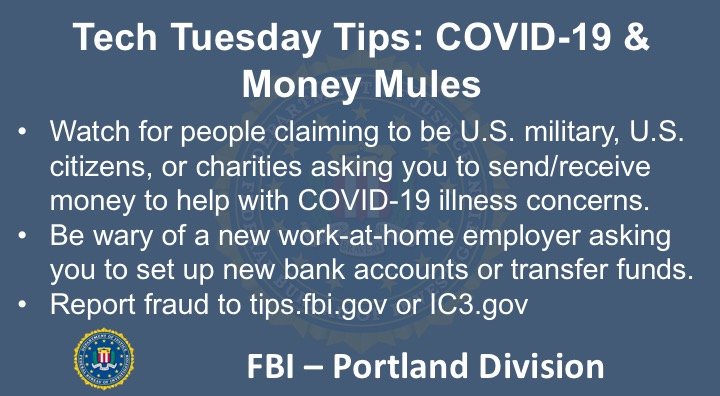Oregon FBI’s Tech Tuesday: Avoid becoming a ‘money mule’ amid COVID-19

PORTLAND, Ore. (KTVZ) -- This week, the Oregon FBI’s Tech Tuesday segment focuses on building a digital defense when it comes to "money mule" schemes related to COVID-19.
Fraudsters are taking advantage of the uncertainty and fear surrounding the COVID-19 pandemic to steal your money, access your personal and financial information, and use you as a money mule.
When criminals obtain money illegally, they have to find a way to move and hide the illicit funds. They scam other people, known as money mules, into moving this illicit money for them either through funds transfers, physical movement of cash, or through various other methods. Money mules are often targeted through online job schemes or dating websites and apps.
Acting as a money mule — allowing others to use your bank account or conducting financial transactions on behalf of others — not only jeopardizes your financial security and compromises your personally identifiable information, but it is also a crime.
Protect yourself by refusing to send or receive money on behalf of individuals and businesses for which you are not personally and professionally responsible. The FBI advises you to be on the lookout for the following:
Work-from-home schemes
Watch out for online job postings and emails from individuals promising you easy money for little to no effort. Common red flags that you may be acting as a money mule include:
- The “employer” you communicate with uses web-based services such as Gmail, Yahoo, Hotmail, Outlook, etc.
- You are asked to receive funds in your personal bank account and then “process” or “transfer” funds via wire transfer, ACH, mail, or money service businesses, such as Western Union or MoneyGram
- You are asked to open bank accounts in your name for a business
- You are told to keep a portion of the money you transfer
Individuals claiming to be located overseas asking you to send or receive money on their behalf
Watch out for emails, private messages, and phone calls from individuals you do not know who claim to be located abroad and in need of your financial support. Criminals are trying to gain access to U.S. bank accounts in order to move fraud proceeds from you and other victims to their bank accounts. Common fictitious scenarios include:
- Individuals claiming to be U.S. service members stationed overseas asking you to send or receive money on behalf of themselves or a loved one battling COVID-19
- Individuals claiming to be U.S. citizens working abroad asking you to send or receive money on behalf of themselves or a loved one battling COVID-19
- Individuals claiming to be U.S. citizens quarantined abroad asking you to send or receive money on behalf of themselves or a loved one battling COVID-19
- Individuals claiming to be in the medical equipment business asking you to send or receive money on their behalf
- Individuals affiliated with a charitable organization asking you to send or receive money on their behalf
If you are looking for accurate and up-to-date information on COVID-19, the CDC has posted extensive guidance and information that is updated frequently. The best sources for authoritative information on COVID-19 are www.cdc.gov and www.coronavirus.gov. You may also consult your primary care physician for guidance.
If you believe you, or someone you know, has been solicited to be a money mule, please contact your local FBI field office. To report suspicious activity, please visit the FBI’s Internet Crime Complaint Center at ic3.gov.